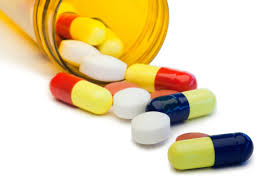drug
英 [drʌɡ]
美 [drʌɡ]
- n. 药;毒品;麻醉药;滞销货
- vt. 使服麻醉药;使服毒品;掺麻醉药于
- vi. 吸毒
- n. (Drug)人名;(罗)德鲁格
使用频率:

记忆方法
将“drug”与“drudge”联想,想象一个人(drudge)辛苦地搬运着大量的重物(drug),形成一种图像,帮助记忆这个单词意味着药物。
以上内容由AI生成, 仅供参考和借鉴
中文词源
drug 药品,毒品
词源同dry, 干。原指干草药,香料等物品。俚语义毒品,麻醉药。
英语词源
- drug
-
drug: [14] Drug is one of the mystery words of the language. It is clear that English acquired it from Old French drogue, but no one is certain where the French word came from. One suggestion is that it originated in Arabic dūrawā ‘chaff’; another, rather more likely, is that its source was Dutch droog ‘dry’, via either the phrase droge waere ‘dry goods’ or droge vate ‘dry barrels’, a common expression for ‘goods packed in barrels’. It has spread to many other European languages, including Italian and Spanish droga, German droge, and Swedish drog.
- drug (n.)
- late 14c. (early 14c. in Anglo-French), "medicine, chemical ingredients," from Old French droge "supply, stock, provision" (14c.), which is of unknown origin, perhaps from Middle Dutch or Middle Low German droge-vate "dry barrels," or droge waere, literally "dry wares," but specifically drugs and spices, with first element mistaken as word for the contents (see dry goods), or because medicines mostly consisted of dried herbs.
Compare Latin species, in Late Latin "wares," then specialized to "spices" (French épice, English spice). The same source produced Italian and Spanish droga, Swedish drog.
Application to "narcotics and opiates" is late 19c., though association with "poisons" is 1500s. Druggie first recorded 1968. To be a drug on or in the market (mid-17c.) is of doubtful connection and may be a different word, perhaps a play on drag, which was sometimes drug c. 1240-1800. - drug (v.)
- c. 1600, from drug (n.). Related: drugged; drugging.
权威例句
- 1. Doctors are complaining about being barraged by drug-company salesmen.
- 医生们抱怨他们疲于应付医药公司的销售人员。
- 2. She's kicked her drug habit and learned that her life has value.
- 她已经戒了毒,并且认识到了生命可贵。
- 3. They have been treated with this drug in clinical trials.
- 他们已在临床试验中接受过这种药物的治疗。
- 4. The war against drug peddling is all about cash.
- 禁毒斗争归根到底是钱的问题。
- 5. In 1985, he began to show signs of alcohol and drug dependency.
- 在1985年,他开始表现出酗酒嗜毒的迹象。